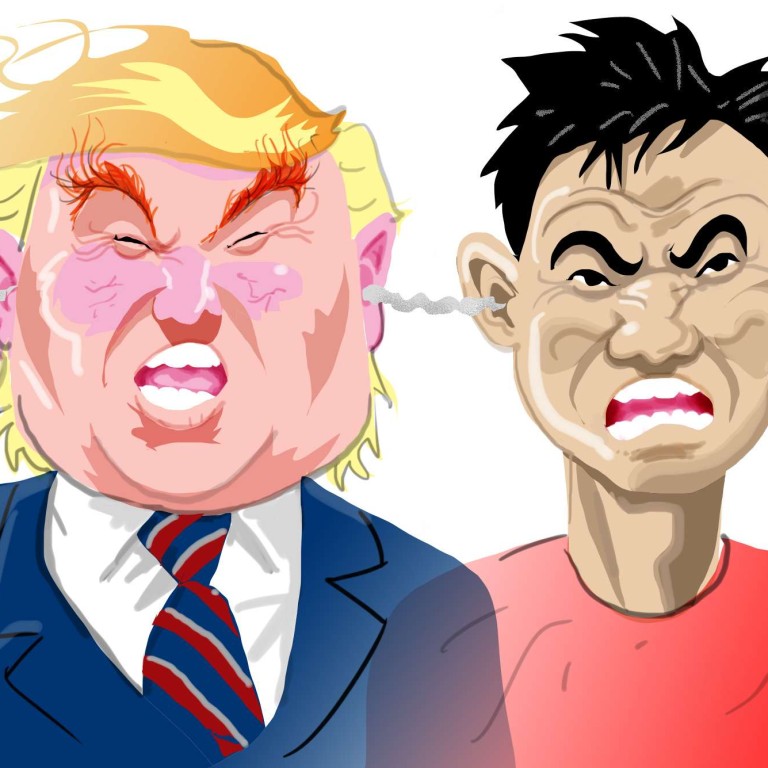
Both Donald Trump and Hong Kong’s localist movement are tapping a vein of popular anger
N. Balakrishnan says it would be foolish to dismiss either, not least because of the possible big impact on the world of a Trump presidency in the US

READ MORE: How Donald Trump took a wrecking ball to the Republican Party’s hopes of broadening its appeal to Hispanic voters
Those interested in the fantasy of ‘independence’ for Hong Kong might want to read the history of the short-lived independent ‘California Republic’
In much the same way that Hong Kong “localists” think of mainlanders, Trump thinks the US should keep away people from nearby territories with long historical links, such as Mexico. Not many people in this part of the world know that both California and Texas, two of the largest states, were “acquired” from Mexico after it was defeated by the US in 1848 – around the time that Hong Kong was “acquired” by Britain after the Opium War.
Those interested in the fantasy of “independence” for Hong Kong might want to read the history of the short-lived independent “California Republic”, which was taken over by the US in 1846. To this day, the state flag says “California Republic”, the only trace left of independence.

In the same way here, “mainland” influence in Hong Kong has not been kept out by the immigration checkpoints near Lo Wu.
READ MORE: Donald Trump’s rise in America is a cautionary tale for democracy seekers in Hong Kong to go slow – and get things right
It is wrong to say that Trump is popular only with the uneducated and crude. The reason he is able to appeal to such large sections of the white working class is because such people feel globalisation and “free trade” have had a negative effect on their jobs and living standards. Similarly, a significant minority, not just in Hong Kong and but also in Taiwan, feel that China’s “opening” has not benefited them in the same way that it has the owners of businesses and capital looking for cheaper labour.
Politics is, in the end, not about morality but about how people perceive their self-interest and whether they think a certain candidate will represent and fight for that interest. That is why Trump and the “localist” movement should be taken seriously, whether we like them and agree with them, or not.

Even if Trump fails in his bid for the US presidency, the political forces he has unleashed will not go away
It worries me that people in Asia are woefully unprepared for the serious possibility of a Trump presidency. So far, all I have seen are sniggers and confusion about how this clown could come this far and the hope and wish that he will surely lose in the end. But right now, a Trump win looks more likely and Asia must prepare for it.
Part of the problem is that the American “experts” on the seminar and conference circuit in Asia are mostly, if not entirely, “friends of China” – academics and CEOs who have benefited from globalisation. Since they benefit from the current system, they tell Asian hosts what they want to hear, not about the “peasants” rising up in the US.
READ MORE: What would a Donald Trump presidency mean for US trade and diplomacy within Asia?

READ MORE: Donald Trump brands 1989 pro-democracy demonstrations in Beijing’s Tiananmen Square a ‘riot’
Such cynicism, however, may be misplaced this time around. Those who look at Trump’s past realise that, as early as the 1990s, he had taken out newspaper advertisements to say that countries such as China had been taking advantage of the US on the trade front. Clearly, it’s something he feels strongly about. He may be factually wrong but he is not faking his views to get elected. If he wins, I dare say he would impose high tariffs on goods from Asia and want to renegotiate many trade deals.

In the 1930s, Americans made a similar error about China because they ignored the looming realities and preferred to listen to soothing messages. Chiang Kai-shek and members of his US-educated family charmed many members of the American senate and mass media, convincing them that the “Communist bandits” in the hills would be nothing more than a nuisance. Chiang’s cabinet had more Harvard-educated members than did president Franklin D. Roosevelt’s and so Americans believed the Kuomintang. We all know what happened. There were other voices, such as Edgar Snow, who wrote Red Star Over China, but such lone voices were ignored.
Even if Trump fails in his bid for the US presidency, the political forces he has unleashed will not go away and will lead to a fundamental reordering of US politics and, by extension, world politics. Those who snigger at Trump as just a TV reality show host do so at their own peril.
I was a student in the US when Ronald Reagan was elected and heard similar sniggers, with people asking what one could expect from an actor. Reagan had the last laugh when the Berlin Wall fell. Whether or not we like Trump and his views, they deserve to be taken seriously. The era of “localism” may be spreading around the world, be it in the US, Hong Kong or Europe.
N. Balakrishnan is a Hong Kong-based businessman

